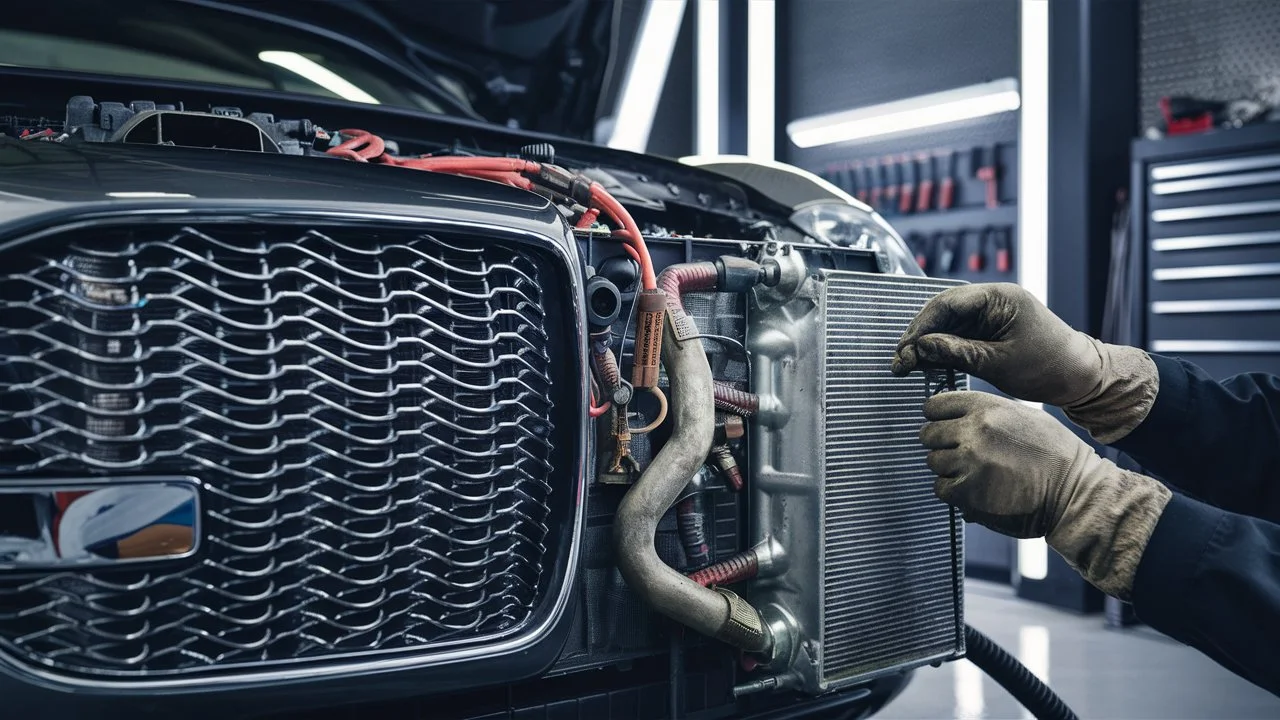 Date: July 17, 2024
Date: July 17, 2024
It happens to many of us when we are driving happily along the way, and then a burning smell comes out of the car. Usually, the first thing that comes to mind is that it’s just the car overheating. You get all tense as you look down at your car’s dashboard, blaming yourself for not properly checking the engine temperature monitor and trying not to think about where you can pull over to save yourself and the day.
But what happens if the engine temperature indicator is clearly normal and you still get the burning smell coming from the windows and the vents? Now what’s the reason for that?
If the car isn’t overheating and you can’t figure out the real reason behind the car’s burning smell, you might want to pay close attention to what other signs and warnings are trying to tell you. In fact, various minor and major mechanical issues can create a burning smell without overheating. You will be able to avoid a great deal of stress and possibly even save some money if you are aware of these indicators and what you can do about them.
Here are some of the major reasons why a burning smell is coming from your car
A Coolant Leak
_1721207502.webp)
A pleasant scent and steam usually and frequently comes out together from a small coolant leak, caused by a failing gasket, a radiator hose hole, and an open thermostat. The coolant leak could fall onto the heated engine or trickle over the exhaust manifold due to gravity. Even yet, a coolant leak might travel through a wire, hose, or pipe and deposit far from the source of the leak.
Mouse Nest Near The Heater Core

A mouse nest in the heater core will give off a burning smell that is a combination of mouse pee and repulsive smells of burned hair. When you switch on your cab heater, you'll probably notice it, and the hotter it gets, the stronger it will be. In the winter, when mice and other rodents are searching for warm places to raise their pups (babies), this is more likely to occur.
Additionally, blocked blower fans and dirty wiring may cause buzzing noises. In addition to the burning smell, if the mice have chewed their way into the vent system, you may smell the sickeningly sweet, musty scent of mouse urine.
Short Circuited Wires
_1721207534.webp)
Typically, a burning smell indicative of melting plastic or heated metal suggests that there are short wires. This can be the result of internal cab wires or fuses. Even so, it's more likely to originate from engine bay wiring and go to your nose through your vents.
Older cars that may have had a mouse nest or a cat sneak inside are more likely to have short-circuited wires. However, shorted or short-circuited wires may also occur as a factory problem in a recently purchased new car.
It can seem like you're chasing gremlins when trying to locate the shorted or circuited cables. The burning smell could be coming from any number of malfunctioning cables.
Engine Oil Seal Failure
_1721207600.webp)
An alarming indicator of a failing oil seal is a burning smell that has a distinct petroleum oil scent. Little seeps or leaks of oil occur in the early stages of an oil seal breakdown. After that, it may fall on the exhaust system's lower components or leak onto the engine bay's heated sections.
With time, older cars may experience engine oil seal failures that produce a burning smell without overheating. Premature oil seal failure can be caused by regularly running the engine hot or by having too much oil in the oil pan following an oil change.
A Bad Or Failing Alternator
_1721207656.webp)
Your alternator may have failed bushings if it smells like burned plastic and hot wires. When the engine is running, your car's alternator is always functioning, and you'll probably sense it more when the engine revs.
The brushes and winding insulation can break down over time. If there has been regular hot running of the engine bay or alternator below 100,000 miles, this is even more likely to be an issue.
A Loose Serpentine Belt
_1721207705.webp)
A burnt rubber smell that intensifies while driving and becomes worse when the car is at rest could suggest that the serpentine belt is loose. The smell of burned rubber may even come from the engine bay, moaning or slapping just before your vents release the smell.
In the meantime, through a network of connected pulleys, your car's serpentine belt uses a tiny amount of the engine's power to run other parts like the alternator, water pump, power steering pump, and air conditioning compressor. A mastering tensioner pulley ensures that the serpentine belt has enough taught tension.
The serpentine belt may begin to slip if the tensioner pulley, or any other pulley in the engine components driven by a belt, becomes misplaced, broken, or is not adjusted correctly. The automobile frequently starts to smell like burned rubber as a result of this issue, rather than overheating right away.
A Minor Exhaust Leak
_1721207718.webp)
A burning smell coming from a car without overheating may be indicative of a leak in the exhaust manifold, a fractured catalytic converter, or a rusty muffler or tailpipe.
When you're sitting at idle, the smell will typically develop stronger over time. When you drive away, it can then suddenly disappear, leaving the majority of the exhaust fumes that are leaking in the breeze behind.
The actual concern here is that dangerous carbon monoxide gas is odorless and may be building in your car while you drive, even though you may detect small amounts of burning and exhaust fumes.
It is preferable to drive with the window down until you can properly remedy the exhaust leak if you have cause to assume that it is the source of burning smells coming from your automobile.
A Burnt-Out Blower Fan Motor
_1721207748.webp)
The smell of melting or burning plastic may indicate that the blower motor fan has burned out. The air that emerges from your vents will be feeble or nonexistent during this time. Little strands of smoke that have a white-blue color may even be visible emerging from the top dash vents.
Frequently, these smells are followed right away by an odd ticking or growling sound as the fan blades come into contact with the melting plastic housing.
A Fluid Leak
_1721207765.webp)
Without the car overheating, a variety of fluid leaks can produce a burning smell. The extent of these can vary, ranging from something as minor as oil spilling into the exhaust manifold from the dipstick to something more serious like coolant splashing onto the engine block due to a cracked cylinder head.
The most typical and unnoticeable fluid leak occurs when you or a fast lube shop changes the engine oil and a few drops drip down into the exhaust manifold or engine components instead of passing through the hole. If so, the burning smell normally disappears within 15 to 20 minutes of driving.
Old Oil
_1721207777.webp)
When your car is stored for a long period, the old oil might break down and provide an odour that is similar to burning without the engine overheating. If you drive one automobile in the summer and another in the winter, this is also a possibility.
Oil begins to degrade and turn exothermic when left to sit for an extended period of time. This will give off a burning smell that is unmistakably that of burning oil together with a melted wiring odour.
Conclusion
There are numerous reasons why a car may smell burning yet not be overheated. However you shouldn't ignore the majority of them. The burning smell should go away if you recently changed your oil or if you checked your oil and saw a few droplets had come off the dipstick.
There's a good chance that the burning smell coming from the car is caused by an exhaust system issue if it smells sulfurous. You should drive with the window down while trying to determine whether the issue is with the exhaust manifold, the muffler, or the catalytic converter.
Burned-out wheel bearings, a stuck brake caliper, or a tire rubbing on a wheel well could be the cause of the burning smell if it is accompanied by noises as you accelerate or brake. If these mechanical issues are not fixed in a timely manner, they may result in total wheel failure, leaving you stuck on the side of the road and facing hefty repair costs.
